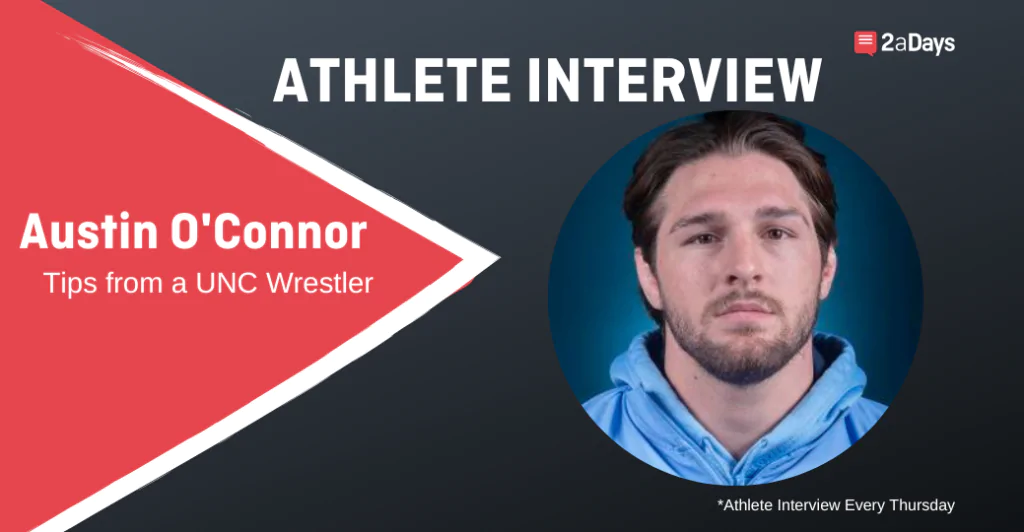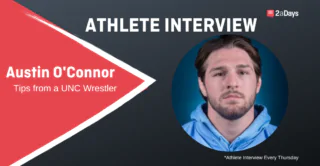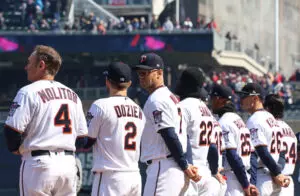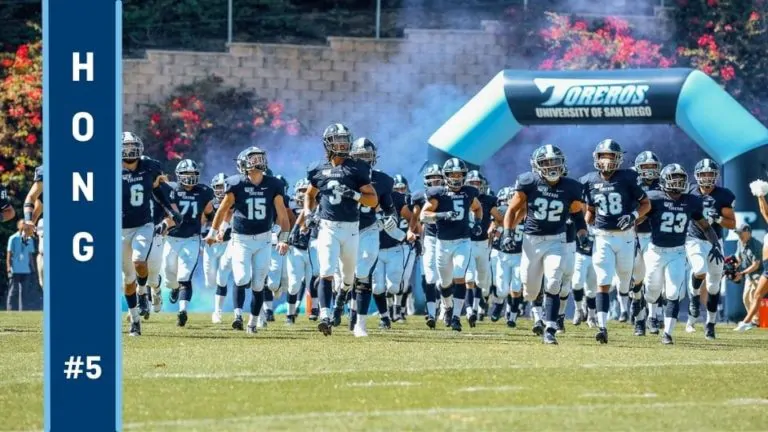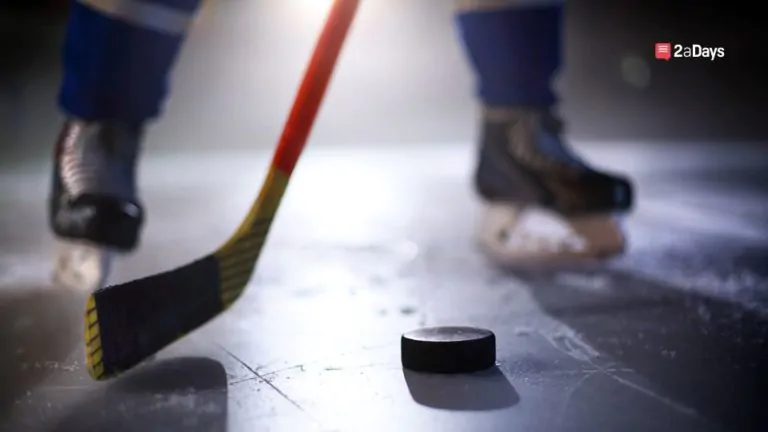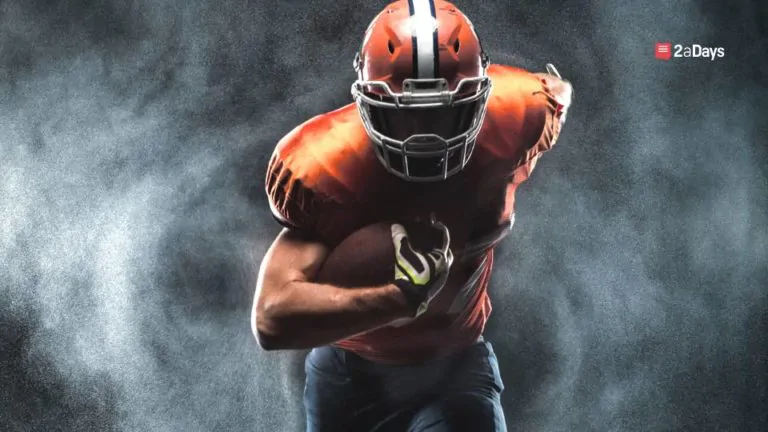It isn't easy for a wrestler at any level to finish a match on one leg. But University of North Carolina's Austin O'Connor did it during the 2022 NCAA Championships. O'Connor tore his ACL and MCL in his right knee in practice less than a month before the championships. He somehow managed to compete in the tournament, finishing eighth last year virtually on one good leg.
Such tenacity can sometimes backfire–but it's a key ingredient to O'Connor's success. The Lockport, Illinois native won his first NCAA national title in the 149-pound weight class as a redshirt junior, earning a 3-2 victory over No. 1 seed Sammy Sasso of Ohio State. This past season, he beat Sasso again to win his second national title, this time in the 157-pound class.
Related: Rutgers University Wrestler, Nick Suriano, on Persistence to Become a Champion
Now that his collegiate wrestling career is complete, O'Connor plans to be a volunteer assistant for a year and hopes to make the MMA circuit. He spoke with 2aDays about his experiences and shared advice for high school athletes on recruiting, preparation and balancing athletics with academics. Some comments have been edited for brevity and clarity.
2aDays: How did you become passionate about wrestling and why did you choose it as your primary sport?
AO: I started wrestling at a young age and I had a lot of success early on. I had an older brother who wrestled as well. I always loved competing with him and wanted to do better at everything he did. I guess the success at an early age and the competitive edge and [wrestling] being a competitive sport, it just kind of drew me in.
2aDays: At what point did you realize you had the talent to compete at the collegiate level?
AO: That was always the goal growing up, that I wanted to get a scholarship to go to college. I knew my parents probably wouldn't be able to help me too much paying for college, so college was something I was going to have to pay for when I got there. The goal had always been to reach a D1 college or get a scholarship, get my degree and compete at the highest level in folkstyle wrestling.
Related: 3 Great Options and 3 Ways to Decide: Which NCAA Division is Right For You?
2aDays: How did you get coaches to notice you?
AO: There were always combine camps I would go to. I would try to compete at many out-of-state and top tournaments in the country. I think just having success at those out-of-state tournaments helped get them to notice me. Also, when I'd do the combine camps, I'd go out and talk to the coaches, kind of make connections with them if I could. Those were a couple of factors, (but) my wrestling spoke for itself at the end of the day.
2aDays: Why did you choose North Carolina over other schools?
AO: North Carolina wasn't really on my radar at first. I had a few kids I've known from Illinois who committed there, but I just didn't really have any interest. Then right before I got here, they got a whole new coaching staff. I had a connection with all those guys… They're good coaches, they were starting a new program. The campus was beautiful, the weather out here's great compared to other schools. This is probably one of the top academic schools I was looking at. I thought this was a great fit for me.
2aDays: What was the biggest adjustment you had to make going from high school to collegiate competition and how did you adapt?
AO: I think the biggest challenge for all high school athletes coming into college is the adjustment period. You go from high school wrestling rooms, not everybody has the top room in the country where you're winning multiple state titles each year. My high school wasn't that great; we never made a team state tournament. But you come into a college room and they draw the talent there. You've got four-time state champs from all over the country, guys who've been in college a few years and are already All-Americans. I think it's kind of a mental thing. Some days, it's “just get through the practice,” some days it's “work as hard as you possibly can.” It's an adjustment just breaking old habits.
Related: Change of Scenery: Adjusting to a New Team/Campus as a College Athlete
2aDays: You won your first NCAA Championship in the 149-pound weight class, and your most recent one this year at 157. How did you adjust your training regimen to move up?
AO: I wouldn't say there was a major adjustment. I felt big for the weight at 149 already. I felt like I was cutting a lot of weight. During the time I was at 149, I would spend three, four days out of the week trying to perfect my technique. But the last day or two, I was strictly focused on my weight cut so I could be at weight. At 157, the whole time throughout the week I was already pretty close to weight. All I had to do was focus on wrestling and nothing else. I think both sides of that [have] ups and downs, but in the long run they both worked out for me.
2aDays: You've been both an All-Academic ACC and NWCA Scholar All-America honoree. Do you have any advice for high school athletes on how to balance athletics and academics in college?
AO: One of the greatest skills you can have is effective time management. It's hard, but I've always looked at it as you have three areas in your life: your social, academic and sports. When you get to college, you kind of have to take away from your social life a little bit and focus more on other areas because you can't have everything. If you want to be successful in your sport and in the classroom, you have to dedicate a little bit more time to that. It comes with making sacrifices, missing plans with friends, not going out or whatever. You've gotta stay strict on both the sides of school and academics.
2aDays: Can you give some tips for high school wrestlers on preparing both mentally and physically for college?
AO: Consistency is key. That's the biggest factor that's helped me get to where I am. When I came to college, I was consistently trying. I was eating the right stuff, I was coming to practice. Even if it wasn't my day, I wasn't taking a back seat. I was still going after the guy I was wrestling and pushing myself every day. If you can stay consistent and be able to say you pushed yourself hard all week, did the right things outside the room as well, everything kind of starts to click.
Have a story idea or know an awesome athlete we should interview? Email us at [email protected].
Image Credit: UNC Athletics
* Originally published on May 18, 2023, by Stephen Kerr
